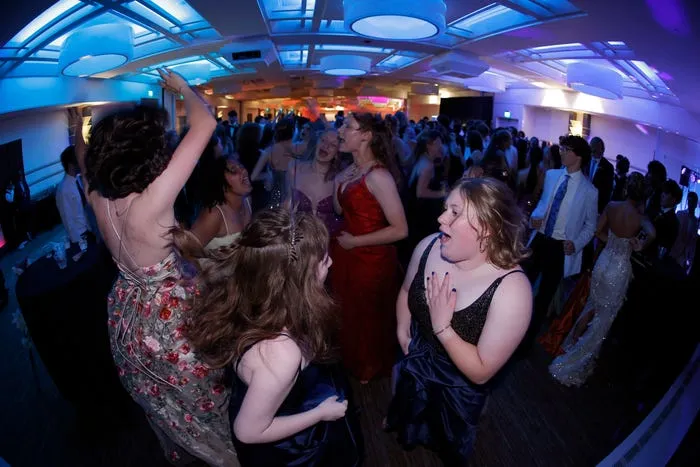The Joyous Glamour of Prom Night
East Lansing High School’s 2025 prom marked a night of celebration, creativity, and youthful exuberance. Hosted at the elegant Kellogg Center, students graced the dance floor adorned in lavish gowns and sharp suits, each one reflecting their personality and dreams for the future. It was a night filled with laughter, music, and striking photographs capturing unforgettable moments, but underneath the surface of joy lies an underreported story of caution and awareness.
Prom Night Magic
As attendees arrived at the Kellogg Center, excitement filled the air. Chemically infused AirPods and electric dance moves were complemented by carefully crafted social media posts showcasing the beautiful decor and blissful smiles. Friends gathered for selfies, documenting their high school memories in a digital age where moments are frozen in time.
Yet, not all prom stories end beautifully. Unbeknownst to many, life-altering experiences linger in the background, waiting to educate and inspire conversations about health that extend beyond the dance floor.
Acne Medication: A Common Solution with Rare Risks
Meet Jessica, an East Lansing resident and a 17-year-old who had always struggled with acne. Like many teens, she had questioned her self-worth in relation to her appearance, yearning for a solution that would change the game. After numerous failed over-the-counter treatments, Jessica was prescribed an acne medication called isotretinoin, known for its effectiveness but also for its potential side effects.
“I was hopeful,” Jessica shared. “I had seen so many people’s journeys where they had clear skin and regained their confidence. I just wanted to feel normal.”
But Jessica’s journey took a dark turn. After starting the medication, she developed an unexpected and severe allergic reaction that would change her life forever. Her story reveals the hidden dangers of seemingly routine prescriptions that many teens rely upon.
The Allergy That Nearly Took Her Life
Just weeks into her treatment, Jessica experienced intense itching and swelling all over her body. Initially dismissed as a common side effect, her parents rushed her to the hospital when her throat began to swell and she struggled to breathe.
“It was terrifying,” she recounted. “I really thought I was going to die. I had never experienced anything like it before. It felt like my world was collapsing in an instant.”
Doctors later confirmed that she had developed an anaphylactic reaction—a rare but life-threatening allergy triggered by the medication. Following a series of treatments, including a stay in the intensive care unit, Jessica recovered, yet the incident left her with lingering health concerns.
Living with the Aftermath
Months of recovery followed. Jessica had to navigate schooling while regularly attending doctor’s appointments and counseling sessions to confront the trauma of her near-death experience. “I had to learn how to advocate for myself,” she reflected. “It doesn’t just end when you leave the hospital. You are left with fear, anxiety, and a new understanding of your own body.”
Acne, a condition that millions of teenagers experience, is often treated with potent drugs without full consideration of their risks. Jessica’s experience serves as a reminder that not every medication is suitable for everyone, highlighting the urgent need for detailed discussions between healthcare providers and patients, especially in teenagers who may lack the vocabulary and understanding of their own health.
A Growing Awareness
Jessica’s story didn’t just spark conversations with her friends but resonated within her community. Since her experience, she has become an advocate for awareness on the side effects of acne medications. “It’s crucial for people, especially teenagers, to understand that what works for one person may not work for another,” she emphasized.
Allergic reactions, while relatively rare, illustrate the broader issue of medical negligence where broader discussions are often sidelined by the desire for immediate cosmetic results. Parents and patients alike often must balance the quick fixes of over-the-counter solutions versus professional advice.
Finding Support
Jessica is not alone. Numerous organizations focus on educating young adults about the potential side effects of medications, particularly regarding common systemic treatments. Healthcare professionals emphasize that conversations around these treatments should include not only benefits but also potential risks.
In light of Jessica’s experience, parents and guardians are encouraged to take a more active role in their children’s healthcare journeys. This includes asking questions, seeking second opinions if necessary, and researching medications being prescribed.
Community Support and Resilience
Jessica’s experience has encouraged her to speak openly not only about her health but also about acceptance and self-love. “I may have gone through something horrific, but it taught me that I have to love myself at every stage of my life,” she explained. “There is beauty in our imperfections.”
This perspective resonated well within the East Lansing community. Students began organizing workshops focused on skin health, mental health, and overall wellbeing, creating safe spaces for sharing experiences and knowledge that was once shrouded in embarrassment and silence. The result has been a wave of empowerment, emphasizing self-love and collective support.
A Call to Action: Navigating Health with Caution
Jessica’s journey is a compelling narrative of resilience and caution, serving as a stark reminder to take a proactive role in personal health. For teens, the desire to fit in often leads to the impulse to seek immediate solutions. However, it’s crucial to approach medication and treatment plans with careful consideration. Educating oneself about potential risks, side effects, and understanding one’s unique body becomes imperative.
As prom photos continue to circulate among East Lansing students, reminding them of fleeting youth and radiant moments, Jessica’s story underlines a need for vigilance—the balance of beauty and health. It is here that Jessica encourages her peers: “Don’t be afraid to ask questions, and listen to your body. Your health should always come first.”
Conclusion
The multiple conversations triggered by Jessica’s experience illustrate the significant need for awareness around side effects of common meds. Prom night may symbolize the thrill of youth, but it should also serve as a moment to reflect on health, relationships with ourselves, and the bonds of community. As students finished their celebrations, they carried with them not just memories, but also a newfound motivation to prioritize their health and support each other in the process.






